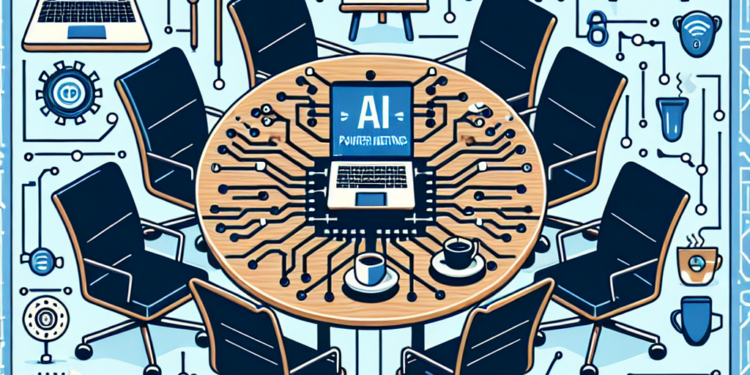In today’s fast-paced business world, meetings are a necessary evil. While they are often essential for collaboration and decision-making, they can also be time-consuming and unproductive if not properly managed. Luckily, advancements in artificial intelligence (AI) are offering solutions to make meetings more efficient and effective. In this article, we will explore how AI-powered hacks can improve meetings and ultimately enhance productivity in the workplace.
One of the biggest challenges in meetings is scheduling. Coordinating the availability of multiple individuals can be a logistical nightmare, leading to wasted time and frustration. AI-powered scheduling assistants, such as x.ai and Clara, can streamline this process by automatically finding common meeting times based on participants’ calendars. These tools can also send out meeting invitations, reminders, and even reschedule meetings if necessary. By delegating the scheduling process to AI, team members can focus on more important tasks and avoid the back-and-forth communication that often accompanies setting up meetings.
Once a meeting is scheduled, the next challenge is making sure it stays on track and remains productive. AI-powered meeting facilitation tools, like MeetingBooster and Krisp, can help keep participants focused and engaged. MeetingBooster offers features such as agenda templates, action item tracking, and meeting minutes generation, while Krisp uses AI to eliminate background noise during calls, ensuring clear communication. By leveraging these tools, meeting organizers can ensure that discussions are efficient and objectives are met in a timely manner.
Another common issue in meetings is note-taking. It can be challenging to capture all the important points and action items while actively participating in the discussion. AI-powered transcription tools, such as Otter.ai and Trint, can automatically transcribe meeting recordings in real-time, making it easier to review the conversation later. These tools can also identify key points and create summaries, saving time and ensuring that nothing important gets overlooked. By using AI to assist with note-taking, participants can fully engage in the meeting without having to worry about missing important information.
In addition to improving the logistics of meetings, AI can also enhance communication and collaboration among team members. Virtual meeting assistants, like Zoom and Microsoft Teams, use AI to facilitate seamless communication through features such as chatbots, automatic language translation, and real-time transcription. These tools make it easier for team members to engage with each other regardless of their location or preferred communication style. By leveraging AI-powered communication tools, organizations can foster a more inclusive and collaborative work environment.
AI can also play a role in improving the content and structure of meetings. Tools like Grammarly and Hemingway Editor use AI algorithms to provide real-time feedback on written communication, ensuring that meeting materials are clear, concise, and error-free. By using these tools to improve presentations, reports, and other meeting materials, participants can convey their ideas more effectively and engage their audience more successfully. Additionally, AI-powered content generation tools, such as GPT-3 and Copy.ai, can help generate meeting agendas, summaries, and follow-up emails, saving time and ensuring that all necessary information is communicated.
Finally, AI can be used to analyze meeting data and provide insights for future improvement. Tools like Zoom and Google Meet offer analytics dashboards that track meeting attendance, engagement, and duration. By analyzing this data, organizations can identify trends, measure the effectiveness of meetings, and make data-driven decisions to optimize their meeting processes. Additionally, AI-powered sentiment analysis tools, like Lexalytics and Monkey Learn, can analyze meeting transcripts and provide insights on participants’ emotions and attitudes. By leveraging these insights, organizations can better understand team dynamics, address issues, and create a more positive and productive meeting culture.
In conclusion, AI-powered hacks offer numerous benefits for better meetings. From scheduling and facilitation to note-taking and communication, AI tools can streamline the meeting process, enhance collaboration, and improve productivity in the workplace. By leveraging these tools, organizations can make meetings more efficient, effective, and engaging, ultimately driving better outcomes for their teams and their business. As AI continues to advance, the possibilities for optimizing meetings are endless, and organizations that embrace these technologies will undoubtedly stay ahead of the curve.













